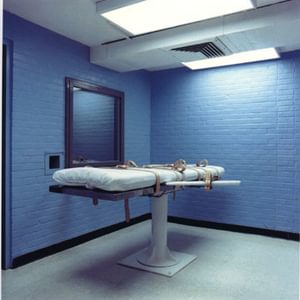
Nebraska Governor Pete Ricketts has vetoed a bill that would have increased transparency in the state’s execution process. LB 238, which passed the state’s unicameral legislature on August 13, 2020 by a vote of 27 – 10 with 12 members present but not voting, would have allowed witnesses to see the execution from the moment the prisoner enters the death chamber until the prisoner is declared dead or the execution is halted.
In his August 17 veto message to the legislature, Ricketts claimed that the bill would have “add[ed] additional burdens to the process of carrying out the death penalty in Nebraska” and “would mandate changes to the [state’s] current execution protocol.” He said state law protects the identity of execution employees and that “[w]earing a mask or disguise in an attempt to conceal their identity could impede necessary procedures if the staff member’s eyesight is hindered or blocked.” Wearing personal protective equipment during the course of an execution “would make a mockery of the execution and show a complete lack of respect for the inmate, the inmate’s family, and for family of the victim,” Ricketts wrote.
The bill’s sponsor, Senator Patty Pansing Brooks, called Ricketts’ action “highly disturbing” and said “it fundamentally betrays the public’s right to accountability and transparency in our State government.” In a statement released in response to the veto, she wrote: “LB238 adds no ‘additional burdens,’ as spuriously claimed by the Governor.” All it would have done, she said, is “prevent[ ] the Department of Corrections from once again closing the curtain on an execution and blocking the view of witnesses who are statutorily allowed to be present.”
She said Ricketts’ complaints about disclosing the identity of execution team members was “blatantly bogus because under current law and LB238, the executioner’s identity was and would have remained protected.”
ACLU of Nebraska Executive Director Danielle Conrad said Governor Ricketts’ veto “was contrary to … Nebraska[’s] proud tradition of open government.” She said Ricketts’ action “will allow state officials to operate in the shadows, carrying out the death penalty without ensuring that witnesses can observe this grave and irrevocable act. Bottom line, the people have a right to know how the state takes a person’s life.”
The execution transparency bill was a bipartisan response to concerns about Nebraska’s 2018 execution of Carey Dean Moore, the state’s first execution by lethal injection. The execution employed a four-drug cocktail that has never been used in any other state, consisting of diazepam (the sedative Valium), fentanyl citrate (an opioid painkiller), cisatracurium besylate (a paralytic), and potassium chloride to stop the heart.
During Moore’s 23-minute procedure, witnesses reported that Nebraska prison officials dropped a curtain three times, blocking their view of the execution. The third curtain drop occurred just after the final drug was administered, preventing the witnesses from viewing the 14-minute period from the administration of that drug to the time Moore was declared dead. The Lincoln Journal-Herald reported witnesses observed that “Moore coughed, his diaphragm and abdomen heaved, he went still, then his face and fingers gradually turned red and then purple, and his eyes cracked open slightly. One witness described his breathing as shallow, then deeper, then labored.”
Nebraska College of Law Professor Eric Berger, who studies the death penalty, said at the time that the eyewitness reports were “somewhat troubling.” “It’s certainly possible that everything went smoothly and humanely, but it’s also possible that it didn’t.… We just don’t have enough information to make that determination,” he said.
Pansing Brooks said the bill was necessary because, as a result of the curtain drops, “[w]e have no way of knowing whether that execution was botched. In the government’s most powerful and solemn act, the taking of a human life, we have an obligation to ensure it is carried out within the highest of standards. So today’s veto can be taken as the intention to continue to carry out this solemn act without oversight, transparency and accountability.”
“The process of taking a life is not the government’s little secret to protect themselves and hide from the public,” she said.
During legislative hearings, correctional officials had suggested that drawing the curtain during the execution was necessary to protect the identities of execution team members. The bill sought to address that concern by permitting team members to wear surgical masks to obscure their identities.
“Wearing a surgical mask doesn’t seem to prevent brain surgeons from seeing what they are doing when they are operating or make surgeries any less dignified,” Death Penalty Information Center Executive Director Robert Dunham said. “It’s hard to imagine how wearing a mask would interfere with the portions of an execution Nebraska is currently hiding from the public.”
The Nebraska legislative session ended August 14, providing lawmakers no opportunity to attempt to override the governor’s veto.
Paul Hammel, Ricketts vetoes bill on witnessing executions, measure offering earlier parole eligibility, Omaha World-Herald, August 17, 2020; Grant Schulte, Nebraska governor vetoes death penalty transparency bill, Associated Press, August 17, 2020; KHJI Staff, Governor Ricketts vetoes seven bills on Monday, NTV News, August 17, 2020; Martha Stoddard, Paul Hammel, Higher smoking age, infant screening, African American commission bills passed, Omaha World-Herald, August 12, 2020.
Read the August 17, 2020 Veto Message by Governor Pete Ricketts and the Statement by Senator Patty Pansing Brooks.
Recent Legislative Activity
Oct 07, 2024

Delaware Officially Removes Death Penalty from State Statutes Eight Years After State Supreme Court Finds It Unconstitutional
Recent Legislative Activity
May 17, 2024

Tennessee Authorizes Death Penalty for Child Sexual Assault in Direct Challenge to Supreme Court Precedent
Nebraska
Jan 12, 2024
